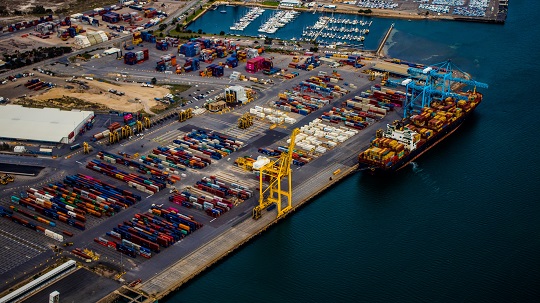Office politics is a common phenomenon that occurs in various types of organizations, including the supply chain industry.
It refers to the activities of individuals or groups within an organization to achieve their goals by utilizing political factors and power within their work environment.
The impact of office politics on the supply chain can be positive or negative, depending on how it is managed and executed.
In this post, we will discuss in-depth the influence of office politics on the supply chain and the role of management in addressing any potential negative impacts.
Before we delve into this interesting topic, make sure that you have also joined the scmguide telegram channel to receive notifications on the latest posts from this blog and gain more insights on other aspects of supply chain management.
Table of Contents
What is meant by “office politics”?
As I mentioned earlier, office politics refers to the activities that individuals or groups within an organization engage in to influence decisions or decision-making, gain personal advantages, expand their power or influence, or achieve their goals through social interactions and the use of political factors present in the work environment.
It involves efforts to obtain personal or group benefits, even if they are not in line with the overall interests of the organization.
Office politics can take various forms, such as debates, intrigue, power consolidation, selection of colleagues, or creation of a favorable self-image.
Indeed, office politics is not always negative, but it can damage relationships and create power imbalances within the organization, and can have a negative impact on productivity, performance, and work morale within the team or organization.
What is supply chain?
Supply chain is a series of activities involving the planning, procurement, production, delivery, and distribution of products or services from manufacturers to end consumers.
The supply chain involves many entities, including manufacturers, raw material suppliers, logistics companies, distributors, retailers, and consumers.

The main objective of the supply chain is to optimize the flow of goods or services from the manufacturer to the consumer in an effective and efficient manner.
In the supply chain, each entity must collaborate and support each other to ensure that the products or services produced meet quality standards and reach customers on time according to their needs.
Effective supply chain management is crucial to ensuring business continuity and maximizing company profits.
The relationship between office politics and supply chain
Office politics and supply chain have a close relationship because both occur within the context of the work environment in an organization.
Office politics can affect the dynamics of relationships between entities in the supply chain and influence the overall performance of the supply chain.
For example, someone within the organization may use political factors to gain personal gain or expand their power.
This could result in poor decisions in procurement of raw materials or inventory management.
What are the consequences?
This could lead to delays in production and delivery, ultimately resulting in financial losses for the organization and customers.
In addition, if office politics take the form of prolonged intrigue and debate, it can create disharmony and damage relationships between entities in the supply chain.
Ultimately, this can also affect the performance and success of the supply chain as a whole.
Therefore, supply chain management must pay attention to and manage office politics well.
Management must ensure that decisions and actions are taken based on the overall interests of the organization, not the interests of specific individuals or groups.
Management should also create a healthy and supportive work environment that minimizes conflict and promotes collaboration among entities in the supply chain.
With effective management, it can help ensure that the supply chain runs smoothly and efficiently, and achieves the overall goals of the organization.
You might also like:
- Make or Buy? A Guide to Making the Right Decisions
- The Importance of Business Process Mapping and How to Do It Effectively
The impact of office politics on the selection of vendors or suppliers
In the business industry, selecting a vendor or supplier is crucial and plays a key role in the success of a company’s operations.
However, the problem is that the decision to choose a vendor or supplier is not always based on objective considerations that truly focus on the interests of the company.

In many cases, political factors and personal interests related to office politics often influence the decision to select a vendor or supplier.
What is the impact of office politics on vendor or supplier selection?
Let’s take a look.
Office politics can influence the selection of a vendor or supplier in many ways.
Firstly, office politics can influence the selection criteria of the chosen vendor or supplier.
For example, someone within the organization may choose a particular vendor or supplier because of personal relationships or specific groups that influence their decision.
Therefore, the decision is not based on the quality of the products or services offered, availability of stock, or more competitive prices.
Secondly, office politics can also influence the bidding or competition process between vendors or suppliers.
Parties with more power or influence within the organization can manipulate the process to ensure that the vendor or supplier they want wins the contract, even if there are other vendors or suppliers offering better or cheaper products or services.
Thirdly, office politics can also influence the relationship with the chosen vendor or supplier.
If the decision made is influenced by political factors and not based on the quality of the products or services offered, the relationship with the vendor or supplier may not run smoothly and may not be mutually beneficial.
The impact of office politics on the selection of a vendor or supplier can be very detrimental to the company.
Choosing a vendor or supplier that is less qualified, or unable to meet the needs of the company, can cause delays in production or delivery, loss of customers, or financial losses.
It is very important to ensure that the decision to select a vendor or supplier is based on objective criteria that are truly beneficial to the company.
The impact of vendor or supplier selection decisions based on political relationships
If the decision to choose a vendor or supplier is based on political relationships, it can have detrimental effects on the company.
Some of these are:
- Poor quality products or services: If the decision is based on political relationships rather than the quality of the product or service being offered, the company may choose a vendor or supplier that is of poor quality. This can result in delays in production or delivery, defective products, and a negative impact on the company’s reputation.
- Higher prices: Vendors or suppliers chosen based on political relationships may not offer competitive prices. This can lead to higher production costs and a reduction in the company’s profits.
- Unfair selection process: If the decision is based on political relationships, the vendor or supplier selection process may not be fair. Vendors or suppliers who have close relationships with managers or other decision-makers may have a greater chance of winning the contract, even if there are other vendors or suppliers who offer better or cheaper products or services.
- Conflict of interest: Political relationships between managers and vendors or suppliers can also create conflicts of interest. Managers who have close relationships with certain vendors or suppliers may not be able to make objective decisions that benefit the company because they are influenced by personal or group relationships.
- Loss of customers: If the product or service offered by the chosen vendor or supplier does not meet quality standards or is priced too high, the company may lose customers because the products or services produced do not meet their expectations or needs.
It is crucial to ensure that the decision to choose a vendor or supplier is based on objective and truly beneficial criteria for the company, not on political factors or personal relationships.
You might also like:
- Why is Sales and Operations (S&OP) Planning Important? How to Effectively Do It?
- What is Capacity Planning? How to Do It Effectively?
The influence of office politics on the production process
What is the impact of office politics on the production process?
Let’s take a look.
When office politics occur, employees can be distracted from their important tasks and become more focused on the political games at play.
This can lead to decreased productivity as employees cannot focus on their tasks. Their time is wasted on maintaining relationships with those in power and influence in the office.

Moreover, when office politics affect management decisions, the decisions made may not always be based on the factors that should influence business decisions, such as product quality, production efficiency, or customer needs.
As a result, the decisions made can impede productivity and product quality.
It is important for management and employees to understand the potential impact of office politics on the production process and to strive to minimize its influence.
How can the political relationship between managers and employees affect the production process?
The political relationship between managers and employees can have a significant impact on the production process.
Office politics can create an unhealthy work environment where employees feel uncomfortable or insecure to speak openly or take initiatives to improve efficiency or product quality.
If managers are involved in office politics that benefit a particular group of employees or department, it can lead to unfair distribution of resources, including labor and budget.
In such situations, employees who feel sidelined or undervalued may lose motivation to work hard, which in turn can affect productivity and product quality.
Furthermore, poor office politics can affect team performance and collaboration between departments.
If managers use office politics to strengthen their position or build alliances with a particular group, it can lead to mistrust and conflict between different departments.
This can slow down the production process and even cause project failures.
To minimize the impact of office politics on the production process, management should ensure that the relationship between managers and employees is based on principles of professionalism, transparency, and integrity.
By building a healthy and productive culture, management can ensure that employees feel valued and motivated to work hard and collaborate to achieve the company’s goals.
The influence of office politics on the distribution process
Next question, what is the impact of office politics on the distribution process?
Office politics can also have a significant impact on the distribution process of an organization.
Here are some of the impacts of office politics on the distribution process:
- Biased decision-making: Office politics can influence the decision-making process in distribution. For example, someone with power in the organization can influence decisions about which party should be prioritized in the distribution process, even though that party should not necessarily get that priority.
- Imbalance in resource allocation: Office politics can also cause an imbalance in resource allocation in the distribution process. Someone who has influence in the organization can influence the allocation of resources in the distribution process for their own interests or groups, without considering the interests of the organization as a whole.
- Sabotage or obstruction: Office politics can also cause sabotage or obstruction in the distribution process. For example, someone who dislikes or envies others in the organization can sabotage or obstruct the distribution process carried out by that party.
- Decreased motivation and trust: Negative office politics can cause decreased motivation and trust in the distribution process. Many employees feel frustrated and dissatisfied with decisions or actions taken in the distribution process, feeling that they are unfair or not in line with the interests of the organization.
- Decreased productivity and quality: Negative office politics can also cause decreased productivity and quality in the distribution process. If decisions or actions taken are not objective and do not consider the interests of the organization as a whole, it can disrupt the distribution process, which will ultimately affect productivity and quality.
It is important for organizations to address the negative impacts of office politics and ensure that decisions and actions taken in the distribution process are based on the interests of the organization as a whole.
You might also like:
- Small Discrepancy in Stocktaking Results, Can It Be Ignored?
- Can Excess Inventory Benefit Your Business?
Impact of office politics on the efficiency and effectiveness of the supply chain
Furthermore, what is the impact of office politics on the overall supply chain?
Office politics can affect the efficiency and effectiveness of the supply chain in several ways, including:
- Delayed decision-making: When there is poor office politics, decision-making can be delayed because managers or leaders cannot reach a consensus. This can affect efficiency in the supply chain process, such as in the procurement of raw materials or delivery of end products.
- Lack of transparency: Poor office politics can result in a lack of transparency in business processes. This can cause uncertainty and difficulties in predicting demand or inventory, which in turn can affect the effectiveness of the supply chain.
- Change in priorities: Poor office politics can cause irrational changes in business operations priorities, such as allocating resources to less important areas or ignoring customer needs. This can disrupt the supply chain flow and reduce its effectiveness.
- Difficulty in collaboration: Poor office politics can cause difficulties in collaboration between departments or organizations involved in the supply chain. This can affect the efficiency and effectiveness of processes, such as in the delivery of products between suppliers and customers.
- Loss of trust: Poor office politics can result in a loss of trust between team members and between organizations involved in the supply chain. This can cause instability in business flow and affect the effectiveness of the supply chain overall.
Organizations must take steps to address these issues, such as promoting open communication and transparency in business processes, building trust between departments and organizations, and upholding professional standards in decision-making and business operations.
By addressing poor office politics, organizations can achieve efficiency and effectiveness in the supply chain, which in turn can improve overall business success.
Risk and consequences if office politics are too dominant in the supply chain
If office politics become too dominant in the supply chain, there are several risks and consequences that could occur:
- Disruption of distribution channels: If office politics become too dominant, decisions may be made based on political relationships rather than business considerations. This can disrupt the distribution channels, causing delays or even failures in product delivery.
- Financial loss: Poor office politics can lead to delays in decision-making and changing business priorities. This can result in financial losses in the business, such as increased costs due to delays or wrong decisions.
- Decreased quality: Poor office politics can disrupt business flow and reduce focus on product or service quality. This can result in decreased quality and customer satisfaction, which can reduce long-term profits.
- Damage to reputation: Poor office politics can lead to a loss of customer and business partner trust, which can reduce the overall reputation of the business. This can result in a decline in demand and long-term profits.
- Loss of key personnel: Poor office politics can create an unpleasant work environment, resulting in the loss of important key personnel for the business. This can reduce the creativity and innovation needed in a competitive business environment.
Office politics that are too dominant in the supply chain can lead to harmful risks and consequences.
Organizations must take steps to address these issues and build a work culture focused on performance and business outcomes.
This can help organizations achieve the efficiency and effectiveness needed for success in a competitive business environment.
Ways to reduce the influence of office politics in the supply chain
The important question is, how to reduce the influence of office politics in the supply chain?
Here are some ways to do it:
- Focus on data and performance: In decision-making, organizations should focus on data and performance rather than political relationships. This will help organizations make better and more objective decisions, as well as improve efficiency and effectiveness in the supply chain.
- Transparency: Organizations must ensure transparency in business processes and enable equal access to information for everyone in the organization. This will help reduce information gaps and minimize the influence of office politics in decision-making.
- Encouraging participation and involvement: Organizations should encourage participation and involvement of all team members in business processes. This will help build an open and inclusive work culture, which can reduce the influence of office politics.
- Clear and open communication: Clear and open communication is crucial in reducing the influence of office politics in the supply chain. Organizations must ensure that all team members have equal access to information and that decisions are made based on open discussion and thinking.
- Setting clear behavioral standards: Organizations should set clear behavioral standards and require all team members to comply with these standards. This will help reduce the influence of office politics in business processes and promote a positive and professional work environment.
Reducing the influence of office politics in the supply chain is important to improve efficiency and effectiveness in business.
Organizations should implement measures to minimize the influence of office politics, promote transparency, participation, clear communication, and clear behavioral standards.
By doing so, organizations can create a positive and professional work environment and improve overall business performance.
Conclusion
Office politics can have a negative impact on efficiency and effectiveness in the supply chain.
This happens when business decisions are based on political relationships rather than data and performance, which can reduce the quality of decisions and worsen overall business performance.
Office politics can also cause problems such as abuse of power, hidden information, and unfair treatment among team members.
All of this can lead to a loss of trust, decreased productivity, and financial losses for the organization.
To reduce the influence of office politics in the supply chain, organizations should take steps such as focusing on data and performance, transparency, participation and involvement, clear and open communication, and setting clear behavioral standards.
By doing so, organizations can create a positive and professional work environment, improve business performance, and improve the overall reputation of the organization.
We hope this is helpful! Please share this article with your colleagues so that they can also benefit from it. Join the scmguide telegram channel to stay notified of the latest articles from this blog and for more insights on supply chain management. All articles on this blog are free for you to use for any purpose, including commercial use, without attribution.

 by
by 

